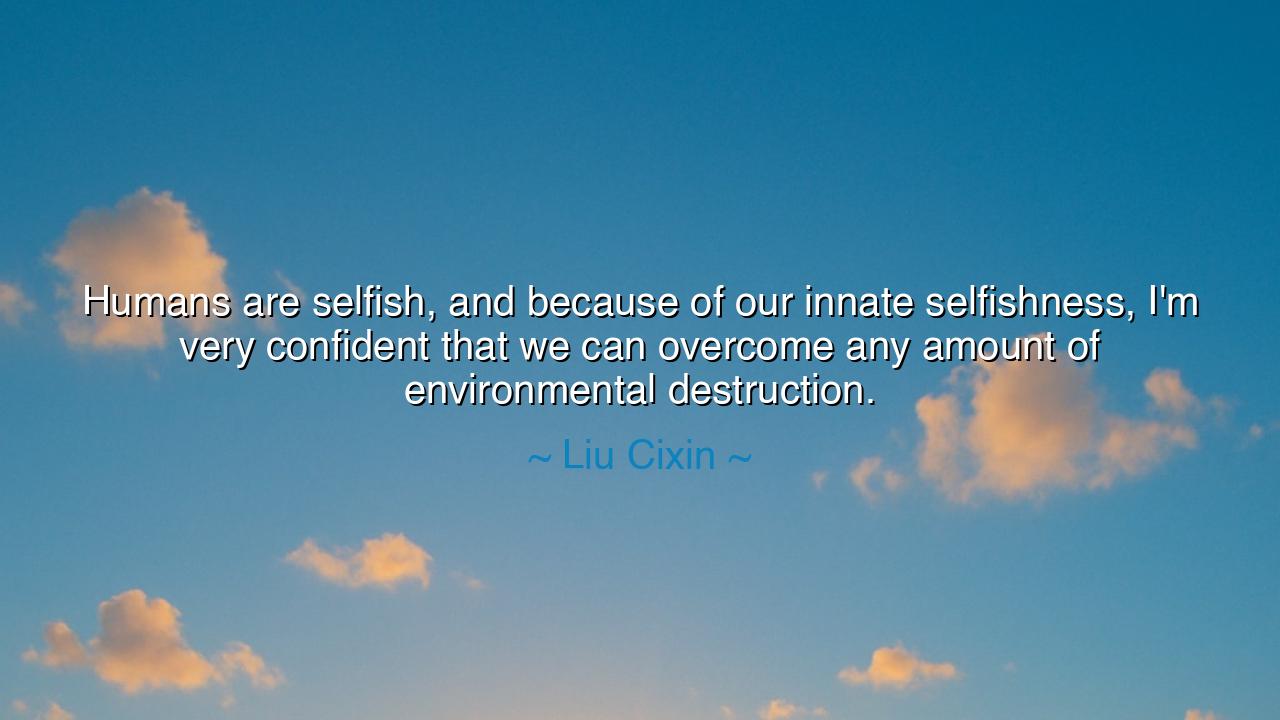
Humans are selfish, and because of our innate selfishness, I'm
Humans are selfish, and because of our innate selfishness, I'm very confident that we can overcome any amount of environmental destruction.






The words of Liu Cixin—“Humans are selfish, and because of our innate selfishness, I'm very confident that we can overcome any amount of environmental destruction.”—sound at first like a paradox, yet within them lies a profound reflection on the dual nature of mankind. The author, famed for his sweeping cosmic vision in The Three-Body Problem, speaks not with cynicism, but with an understanding as deep as the universe he imagines. He recognizes that selfishness, though often condemned, is not merely a curse—it is also the driving engine of survival, innovation, and progress. To Liu, the same instinct that causes humanity to exploit the earth will, in the end, compel it to save it. For when destruction threatens our future, the selfish will to live will awaken the ingenuity to restore.
The origin of this quote lies in Liu’s broader philosophical view of humanity’s place in the cosmos. As a writer of science fiction, he sees mankind not as inherently noble or wicked, but as a species bound by universal laws of nature—one of which is self-preservation. He observes that our selfishness, when guided by fear or desire, becomes a force of unstoppable creativity. When our comfort, prosperity, or existence is endangered, humanity does not lie still; it builds, invents, adapts, and fights back. Thus, what moralists call “selfishness,” Liu sees as the instinct to endure, the very pulse of civilization itself.
Throughout history, this paradox has revealed its truth. When famine gripped nations, it was not saintly compassion alone that drove innovation, but hunger—the selfish yearning to survive. The discovery of agriculture arose not from charity, but necessity. The Industrial Revolution, for all its exploitation, was born from ambition—the desire for comfort, wealth, and power. Yet, from that ambition came medicines, engines, and technologies that lifted billions from despair. Even in times of war and ruin, the human drive to rebuild springs not from altruism, but from the refusal to perish. Liu’s insight, then, is that our self-interest is not our shame, but our fuel for redemption.
Consider the example of the Montreal Protocol of 1987, when the world united to confront the destruction of the ozone layer. Nations acted, not solely from compassion for nature, but from fear—fear of cancer, failed crops, and a collapsing atmosphere. That fear, that selfish awareness of risk, drove one of the most successful environmental agreements in history. The ozone began to heal, and humanity learned that enlightened self-interest could be more powerful than moral preaching. Liu’s confidence springs from this truth: when humanity realizes its survival is at stake, its selfishness becomes the handmaiden of innovation.
And yet, Liu’s vision is not an excuse for carelessness. It is a challenge to understand and harness our nature. He does not say that selfishness is virtuous, but that it is inevitable—and that wisdom lies in redirecting it toward the greater good. Just as fire can destroy or warm, selfishness can consume or create. The task of civilization, therefore, is not to deny our nature but to discipline it, to align personal interest with collective survival. When the preservation of the planet becomes inseparable from the preservation of wealth, comfort, and power, humanity will act with the fury of instinct.
In this sense, Liu’s faith in humanity is neither sentimental nor naive—it is strategic and evolutionary. He believes that when destruction becomes personal, transformation will follow. The oceans may rise, the air may choke, and the forests may burn, but as long as humanity loves itself enough to fear extinction, it will fight for life. It will invent cleaner energy, restore ecosystems, and forge new frontiers—not out of saintly virtue, but out of the unyielding desire to continue. Thus, his statement is not a hymn to selfishness but a prophecy of human adaptability.
The lesson, then, is both humbling and empowering: do not wait for humanity to become angels before saving the earth. Instead, recognize that even flawed beings can create beauty through their flaws. Let us appeal not only to compassion but also to interest—not only to ideals, but to incentives. Build systems where sustainability rewards prosperity, where care for the earth ensures success for its caretakers. For if self-interest leads us to greed, let us be wise enough to make survival itself the greatest treasure.
And so, Liu Cixin’s words remind us that within the shadow of selfishness lies the seed of salvation. The same instinct that built the cities, dammed the rivers, and burned the forests can also heal them. Humanity, restless and self-centered, will not allow its own extinction. In that defiant instinct lies both our danger and our hope. Let us therefore channel our selfishness toward creation rather than destruction, toward foresight rather than folly. For in the end, the selfish desire to live—transformed by wisdom—may yet prove to be the very force that saves us all.






AAdministratorAdministrator
Welcome, honored guests. Please leave a comment, we will respond soon